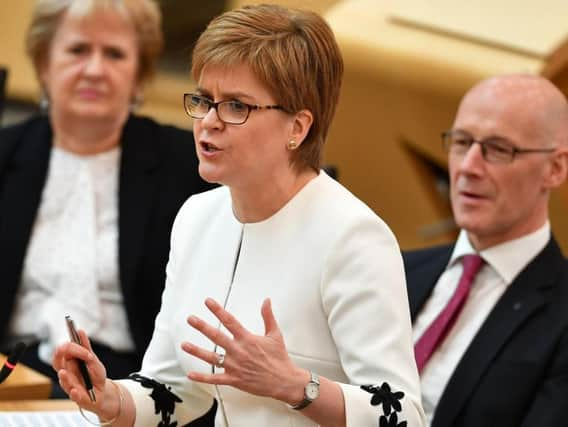Why Scotland must move on from independence referendum Sturgeon cannot call – Brian Wilson


Alex Salmond tells us support for independence should be over 60 per cent while, in the real world, a poll suggests 59 per cent of voters oppose leaving the UK – higher than in 2014.
Five years after Scotland’s “once in a generation” decision, neither constant agitation nor the spectacle created by Brexit has significantly moved the dial. All that has changed is that Scottish politics is mired in a false dichotomy that does not address a single pressing need.
Advertisement
Hide AdAdvertisement
Hide AdIn response to the poll, the First Minister, no less, tweeted that the question it asked was “rigged” – ie not the one which licensed people to wave flags with “yes” on them, an idiocy created by a naïve Electoral Commission five years ago.
Since then, there has been the Brexit referendum which did not suggest difficulty in distinguishing between the terms “leave” and “remain”. Some might say it is “talking Scotland down” for Ms Sturgeon to infer we are incapable of judging between options without the aid of inscribed Saltires.
Ms Sturgeon’s tweet also posed the petulant assertion that if opponents of independence believed the poll “they’d be clamouring for indyref2, but they don’t...”. I fear that merely reflects her assumption that everyone’s view of Scottish society’s best interests is as narrow as her own.
That one-dimensional mindset cannot grasp that normal people might resist another referendum, not for fear of the outcome but because they are sick of the division it foments and attention it diverts from more pressing matters, of which there are many.
With another “flagship” reform, the Named Person Scheme, abandoned at vast cost and six years wasted, one might think a little humility is in order.
But zealots do not do humility. They just revert to sheltering behind the only issue that unites their base, namely the constitution.
Both Salmond and Sturgeon assume the Brexit shambles should make Scottish voters more amenable to another round of bitter division on a constitutional issue, rather than more appalled by the prospect. This week’s numbers suggest they might be wrong. We shall see.
Advertisement
Hide AdAdvertisement
Hide AdMuch was made of comments by Herman van Rompuy, former President of the EU Council, who said an application from Scotland to join the EU would be taken “very seriously” if that situation arose and there was more sympathy within the EU to “the regions of Europe”.
Less attention was paid to Mr Rompuy adding that Scotland would have to meet the conditions of membership, presumably including joining the Euro, while he personally had “fought all my life against separatism in my own country, so don’t ask me to applaud”. These comments were perfectly reasonable in context. They should remind us that Europe is made up of hundreds of nations and regions, a small minority of which are also states. The distinction between “nation” and “state” is one our own Nationalists either do not understand or prefer to ignore.
For example, I was in Brittany this week – an historic nation with its language and culture while also part of the French state. The vast majority of Bretons are comfortable with both identities. The same pattern exists in most European countries where states evolved out of smaller nations.
There is nothing new about Mr Van Rompuy’s “Europe of the Nations and Regions” as a concept which celebrates that diversity within the framework of states. Much more could be done to promote Scottish identity and interests if these objectives were liberated from the obsession with political separation.
I guess that five, ten and 15 years from now, most Scots will want to retain their dual identities – just like vast numbers of other Europeans. The tragedy is that those who cannot live with that concept will never accept the right of the majority to settle the argument.
We live in strange times and Salmond’s intervention reminds us why his successor has to keep banging on about another referendum, knowing fine well she cannot deliver one. For many in Scotland, bread is in short supply while Ms Sturgeon can only divert attention from other matters and await the circus.